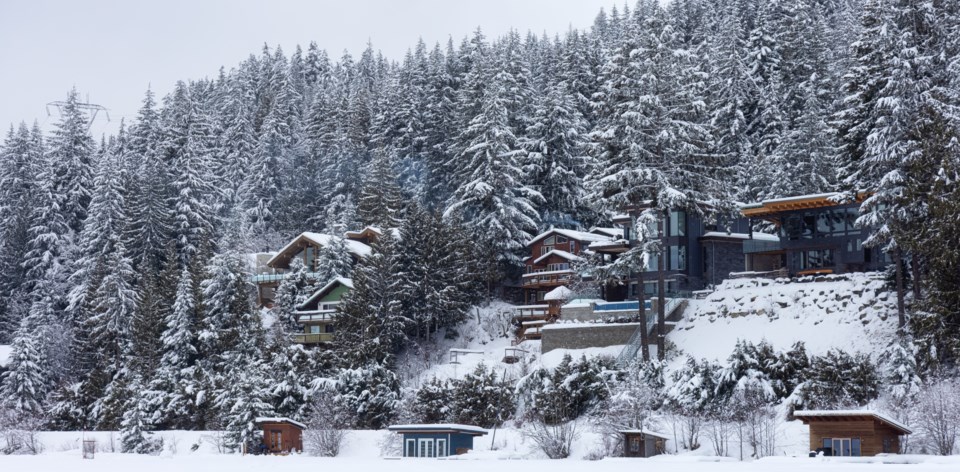Whistler’s real-estate sector is expected to stay steady over the next year, with interest rates still high and buyers and sellers not quite meeting in the middle after the slow year that was 2023.
“In 2023 we had approximately half the number of sales in the overall market as we had in 2021, which was a very fast-paced market,” said Stefanie Hostetter, chief executive officer of RE/MAX Sea to Sky in Whistler.
Hostetter explained 2023 was a low year for the local market, after a rise in interest rates in 2022 put the brakes on sales.
“The pace of the market has certainly been slower, but does that mean the price has come down? The answer to that is, it depends,” she said.
What it depends on is property type—the value of a single-family residential home in Whistler was $2,842,000 of July 1, according to BC Assessment, while strata properties (condos and townhomes) sat at about $1,349,000—decreases of two and one per cent, respectively.
One interesting point about Whistler’s current real-estate market is the number of available properties has not increased, Hostetter said.
“Back when we had our last recession and our slow market after the 2008-09 crash in the U.S. … in [the] years following that, we had a ton of properties on the market that people wanted to get rid of—we’re not seeing that right now. We still have about 250 properties on the market of all property types in Whistler, and that’s a really low number,” she said.
“We’ve got sellers who don’t really have to sell if they don’t want to if they’re not going to get their price, and we’ve got buyers who can’t really afford that price until the interest rates come down, so that’s what’s really slowing that pace of the market. We’ve got a bit of a standoff.”
David Higgins, managing broker of the Whistler Real Estate Company (WREC), said while 2023 was a low point, there were highlights, too.
“It was definitely below the average line over the last 15 years, but when you [look at] the whole market, yeah it’s slower, but there’s definitely some bright spots,” he said.
“We had the highest sale in Canada here last year at $32 million—our high-end properties still move.”
The forces slowing buyer confidence were intentional from the Bank of Canada, with high interest rates implemented in order to slow inflation—but there were other forces telling the Bank of Canada to bring those rates down going forward.
Hostetter said indications from major banks are that interest rates are likely going to start coming down at the end of the second quarter.
“So as soon as those rates start to go down, it loosens up that market a little bit where buyers have a little bit more buying power, a little bit more confidence—we’ve already seen in January they have more confidence with the banks holding rates,” she said. “[But] I’m thinking the Bank of Canada is still going to be very conservative with how they bring down the interest rates.”
The expectation is the prime lending rate—seven per cent as of Feb. 6—will steadily drop moving forward, with any luck landing somewhere around 3.5 per cent by the end of 2025.
“That’s going to really determine the buying power of people in the market, and buying power determines the price things can sell for—I don’t expect the market to all of a sudden go into a frenzy,” Hostetter said.
“I don’t think we’ll have a bumper year. I think we’ll be very conservatively putting deals together, helping people get what they need, what they want, whether they’re leaving the Whistler market or coming into it—I don’t think we will take off again as we did with those two-per-cent interest rates as we did in the pandemic.”
Higgins shared similar sentiments, saying Whistler is being driven by interest, and interest rates—though that is the same for everyone.
“Right now the general consensus is that rates are going to be stable or go down in the summer or fall, and that means we’ll pick up,” he said. “You could take that statement and do an interview in Vancouver, or Kelowna, Moose Jaw, Toronto—that’s the same answer you’d get from any real-estate company or economist.”
Higgins agreed 2023 was a low point, “but not catastrophically low,” and optimism remains cautious.
“There’s optimism out there with the rates, but it really is tempered by what inflation does, and how that affects rates,” he said.
“If you asked any economist last year, they were predicting that rates were going to start coming down in the fall—and that’s economists everywhere—and they were all wrong.”
Higgins added he and his team are keeping a keen eye on policy changes coming down the pipeline that could ultimately affect the Whistler market, such as the provincial-level shakeup of housing density and zoning, and the federal-level ban on foreign buyers and the empty homes tax.
“Housing is a big issue both federally and provincially, and they are throwing all sorts of rule changes at the housing market,” he said. “And some of them are going to affect the Whistler market in ways that we don’t really understand.”




